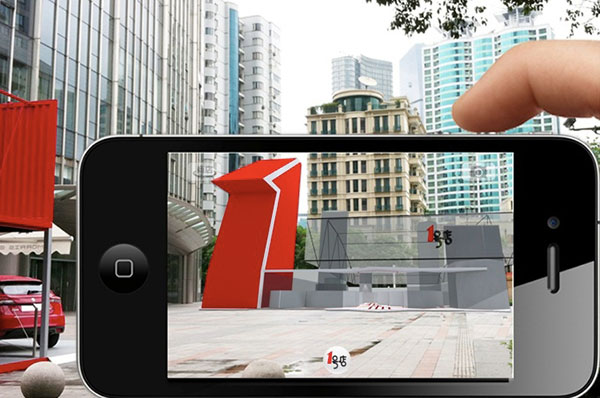Yihaodian, China’s largest food e-commerce retailer, has announced plans to open up the world’s first augmented reality supermarkets in “blank city spaces” across the country. Visitors who go through these spaces without a smartphone will see only “the office open space, parks and college campuses.” But those who arrive equipped with a mobile device will be able to see a fully stocked supermarket, complete with virtual “food” users can scan with a smartphone to put in a “virtual shopping basket” and have delivered at the click of a button, DVice notes.
Yihaodian said each supermarket will have 1,200 square meters of “floor space” and will stock exactly 1,000 items at once, although the specific items in stock will be automatically updated from time to time, the Telegraph reports. The layout of these virtual supermarkets, as seen from a cellphone, will be similar to the layout of “analog” supermarkets, minus the bagging section and the long line for checkout. Steven Millward, a blogger for TechInAsia writes: It’s an interesting concept, fusing the best of online shopping (the speed, the lack of carrying stuff or queueing, the to-your-door deliveries) with the best of the normal act of walking around a store. It cuts out the tedium of making hundreds of clicks on a website or within an app to buy common foods and household items. Think of it as e-commerce but where the “e” also means “exercise.”.
This is only the latest augmented reality venture from Yihaodian, which last year teamed up with the Chinese location-based service Jieping to create a series of shoppable subway advertisements. The ads appeared as photographs of supply-lined supermarket shelves and smartphone wielders could scan QR codes printed under the objects in the photograph to tell Yihaodian to deliver that product to their home. And though Yihaodian hasn’t released its numbers from the experiment, similar ventures by Western retailers have seen success: UK retailer Tesco’s QR-based supermarkets in South Korea, working on the same model, boosted the grocery chain’s online sales by 130 percent.
Yihaodian reports it currently has plans to open 1,000 augmented reality supermarkets, though space concerns and the reception of local governments are possible constraints. But if the venture proves successful and governments prove receptive, there’s no reason the franchise should ever stop expanding; unlike brick and mortar stores, virtual supermarkets cost almost nothing to create. And if names are any clue, that’s something Yihaodian has already anticipated: the augmented reality shops, which plan to open first in the provinces of Guangzhou and Shenzhen, are called (depending on the translation) “Infinite Yihaodian” or “Unlimited Yihaodian.”



